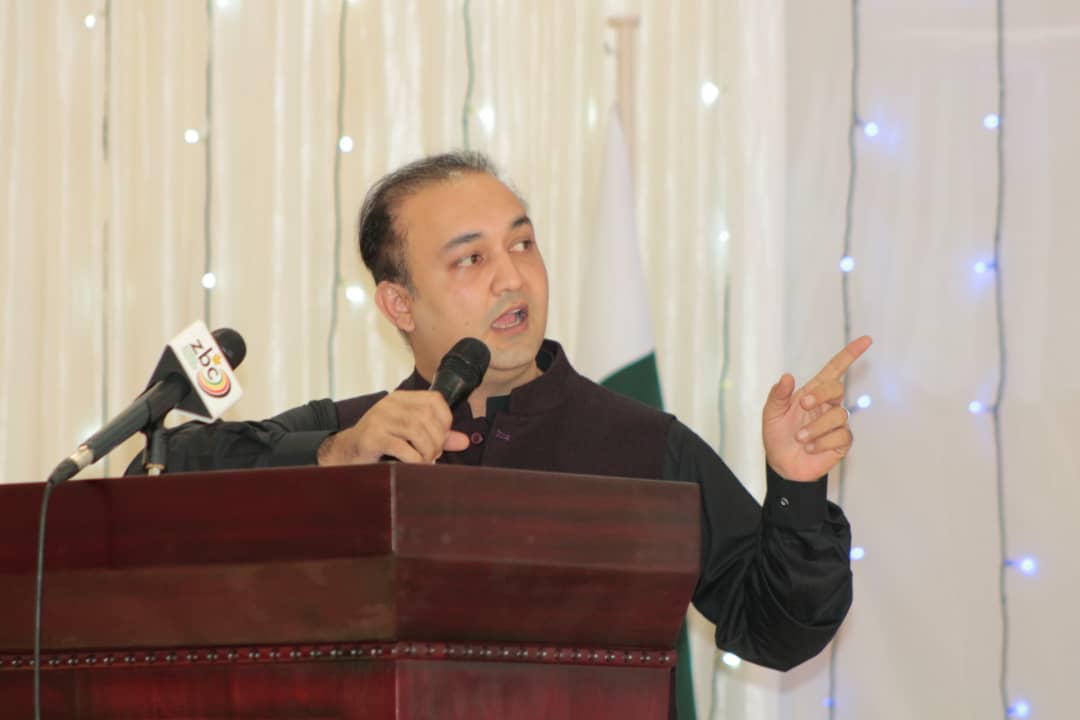|
Getting your Trinity Audio player ready...
|
By Muchaneta Chimuka
PAKISTAN has excellent political co-operation with Zimbabwe, the goodwill that translates into an improvement in our economic, trade relations defence, technology agriculture among others. Herald Correspondent Muchaneta Chimuka (M:C) speaks to Pakistan Charge de’ Affairs’ Mr Fariz Hassan (F:H) to get the insight.
M:C How does the relationship between Zimbabwe and Pakistan look like?
F:H: PAKISTAN is represented in Zimbabwe by maintaining an embassy in the capital city of Harare. The two countries have noteworthy cultural and political ties, such as initiating and participating in joint defence pacts way back in history.
Since 1983, both the countries have been involved in military and defence co-operation.
M:C How many Pastanians are settled in Zim?
F.H Information obtained from the Pakistan Embassy reveals that there are more than 700 Pakistanis who resides in Zimbabwe of which they are mostly intermediate to large business persons.
M:C Briefly explain about Pakistan Ambassador’s Profile?
F:H Mr Fariz Hasan is the Charge’ de’ Affairs (a.i) Acting Ambassador is a retired air force fighter pilot.
He has served at the permanent Mission of Pakistan to the United Nations, New York, USA, and the Acting Ambassador at the Embassy of Pakistan, Kingdom of Morocco.
He holds a Master in Finance & a Masters in Banking. He is 36 years of age.
He was posted to Zimbabwe in 2020.
M:C What is your area of focus to improve Zim-Pakistan Relations?
F:H The mission mandate is to complete transformation of strategic bilateral relations of commerce, trade & economics under symbiotic framework resulting in a win-win situation.
As highlighted earlier we see great potential in health care, education, satellite technology, mining, data automation & construction.
Currently, talk are underway to achieve these milestones. We are confident these will translate into job creation, poverty eradication and national wealth.
M:C What is your impression to Zimbabwe, the business environment, tourism and the people in general?
F:H Zimbabwe has fertile land, manageable young population, peaceful neighbours, geo-strategic location in terms of (AFCFTA), law and order is under control and transparency, burgeon democracy, connectivity and political will.
Zimbabwe is surely a gifted country it has immense potential in agriculture, tourism, tourist trade, information technology and entreprenual hub especially of the AFCFTA in order to attract more FDIS, EPIs and other forms of capital venture.
Readjustment and perception management is and perception management is provisionally vital.
I love the people here, I feel at home, happy and content. Zimbabwe’s direction is a true reflection of good political leadership and strong political will with all the best to the brotherly country of Zim.
PAKISTAN INDEPENDENCE DAY INTERVIEW
About Pakistan:
M:C What is the importance of 14 August to the people of Pakistan?
F:H On 14 August, 1947 Pakistan achieved independence and was declared a sovereign state marking the end of the British Raj. The long struggle that started with the Indian Rebellion of 1857 where the Crown assumed full control of the Indian subcontinent culminated into freedom on this very day celebrated as Pakistan’s Independence Day every year.
M:C What is the difference between Pakistan Day held in March and the Pakistan Independence Day?
Pakistan Day or Pakistan Resolution Day, also Republic Day, is a national holiday in Pakistan commemorating the Lahore Resolution passed on 23 March 1940. The Lahore Resolution was a formal political statement adopted by Indian Muslims on the occasion of its three-day general session in Lahore on 22–24 March 1940. The resolution called for independent states in a manner that geographically contiguous units are demarcated in a manner in which the Muslims majority as in the North Western and Eastern Zones of (British) India should be grouped to constitute ‘independent states’ in which the constituent units should be autonomous and sovereign.
The resolution formed the basis of the freedom struggle that ensued resulting in what we know as Pakistan.
M:C Of late Pakistan faced terrorist challenges which also threatened the economy, how is the situation now?
F:H It pains me to inform that Pakistan has lost over 80,000 precious lives, incurred losses of more than USD 150 billion in the last two decades due to foreign terrorism networks and an imposed protracted war. In recent years Pakistan carried out Broad Spectrum Security (Counter Terrorism) operations in the affected areas and was successful in eradicating the scrounge of deteriorating law & order situation in the country.
As of now the law & security situation is widely under control except for one or two odd incidences remnants of foreign terrorist sleeper cells and spill overs from US withdrawal from Afghanistan. This improved law & security situation has allowed Pakistan to focus on commerce, trade, tourism, connectivity and activity, the New Pakistan, as we like to call it.
Pakistan is actively engaged with all relevant stakeholders including our neighbours, global powerhouses and others to come to table and discuss our differences on all issues particularly Kashmir for the common goal of regional peace & security, poverty eradication and common prosperity. The response has been not adequate but Pakistan plans to continue its efforts.
M:C How is the country’s economy faring
F:H In contrast to the shrinking global economy, breakage of supply chain, productivity reduction, job cuts, lockdowns and fiscal contractions, Pakistan has been able to fend off the externalities with a remarkable strategy of smart lockdowns. Pakistan never went into full lockdown and was able to save the livelihood of most citizens thereby cushioning its economy. This year saw record exports by Pakistan as well record consumerism within the country.






